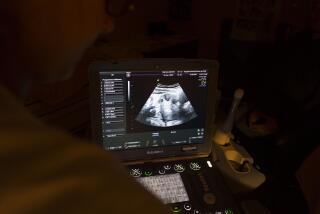Does Life as a Patient Begin Even Before Patient Is Born?
- Share via
The National Institutes of Health and the Food and Drug Administration will resume this week their consideration of a research project that may produce the first human in whom a nonparental gene may be inherited.
This manipulation of DNA present in germ cells, destined to populate the adult ovaries or testes--also called germline genetic engineering--may have profound implications for the relationship of humans to their evolution and biological future, if allowed. But the suggestion about our modifying people’s hereditary information to improve it is not even the most troubling aspect of this new endeavor. Giving the fetal targets of this research the status of “patient” would be.
Those who enter into that special human relationship to receive medical care or information are patients.
Whether to treat an illness or prevent one, the person who seeks a health care provider generally desires good communication and quality service.
While practitioners have become partners rather than oracles in health care only over the past half-century, becoming a patient still can mean grappling with fear of death or chronic illness and a range of other vulnerabilities.
And health care providers respond. Attention, diligence, empathy and other great efforts generally characterize how those who are dedicated to caring for their patients approach their calling. Doing no harm and trying to do good often requires a significant emotional investment by caregivers. So who gets this wonderful human form of kindness?
Adults or their guardians consent to this relationship and parents give permission for their children. But are fetuses patients?
For years, health providers while looking after pregnant women have assessed and tried to alter the development of the fetus. Rarely, shortly before birth, surgical or other procedures are prescribed in order to improve the health prospects of the child after birth
But the proposal now under federal review would offer specific genetic treatments to fetuses less than 24 weeks of age; it would define them as ill or deserving of active disease prevention.
Functionally, they would be patients. They would deserve all the heroic knowledge, energies and emotional investment that we routinely expend on sick children and adults.
If accepted, this could mean that patienthood begins at conception if a new embryo inherits a disease-associated gene.
The eight out of 10 fertilizations that do not make it through to birth, most very early in pregnancy, would become mortality statistics and may deserve the fight we often wage against the pain and disability of illnesses, or preventing them.
Earlier and earlier interventions in fetal development, as well as “corrections” in the petri dish, will surely follow. The psychological toll on providers and the cost of these interventions will be awesome.
The implication of defining disease in the genes not only creates early fetal patients but means that many more illnesses are preexisting conditions. The postal worker who developed hereditary blindness after a successful 25-year career and was declined disability by the Department of Labor because his condition was preexisting, was, in fact, ill when hired, or so this reasoning would argue. For many more people, all their lives would become medicalized.
Great strides have been made in understanding disease. New technologies may bring ever more effective treatments in to medicine’s armamentarium.
But most fetuses are not patients and should not be labeled or treated as if they were. Life and the care of living human beings will be significantly harmed if new genetic technologies cause that confusion.






